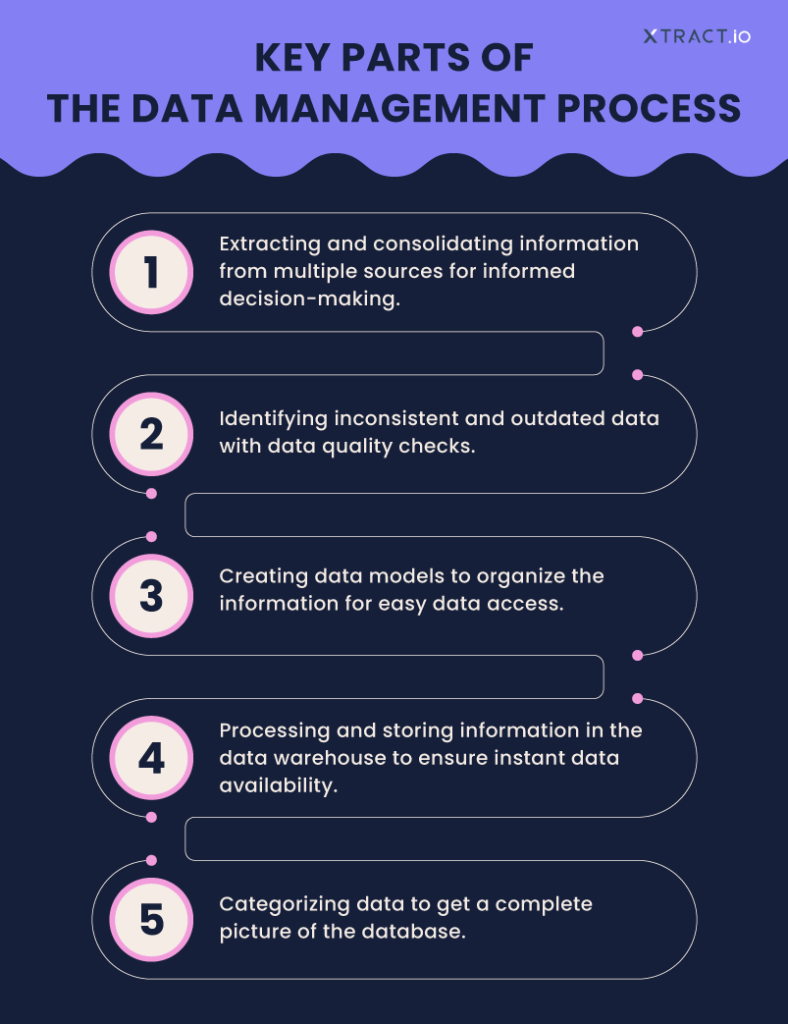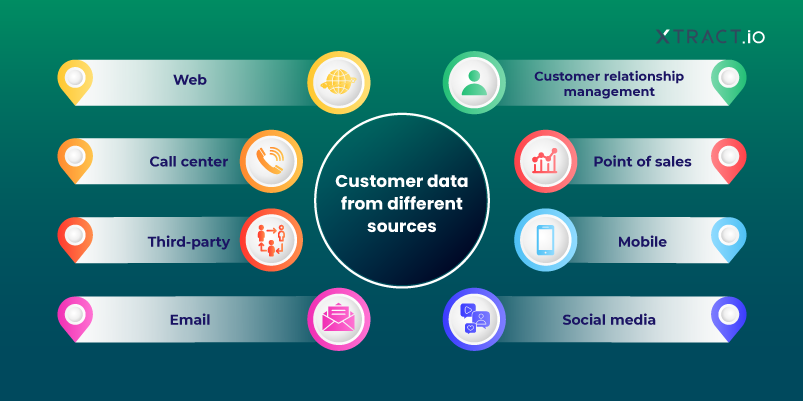Have you ever wondered how Netflix makes the right movie recommendations every time? Netflix considers multiple data, such as the type of series you watch, content abandonment times, browsing behavior, and much more. With over 200 million subscribers worldwide and billions of data generated, it can be difficult. However, Netflix’s commitment to data collection and analysis gives a competitive advantage to them. Not only Netflix, but many other successful companies from various industries, have started adopting powerful data management tools to use the immense volume of data available and outwit their competitors.
You are mistaken if you believe data management is only for large corporations. Data management is essential for all businesses to gain a competitive edge regardless of size or industry. Due to digital transformation, every business is inundated with data. So, companies must identify the right data for precise analysis to learn more about their customers, improve productivity, and avoid unnecessary expenses. An AI-powered data management solution can help achieve this quickly while boosting innovation.
Role of data management in business
With the advent of new technologies, the amount of data generated is increasing more than ever. According to Forrester’s analysis, more than half of the data is left unanalyzed. In an age when data is the key to understanding customers, market trends, and business inefficiencies, unanalyzed data will lead to poor decisions and inhibit business growth. Here is where an agile data management solution can make a difference.
In simple terms, data management is collecting relevant information from multiple sources, ensuring quality, integrating it into a single source for easy access, ensuring compliance, and processing it to derive insights. A data management system will benefit everyone, from C-suite executives to every team member. Data scientists, for example, will use it to analyze their data, whereas business analysts will use it to gather all the data in the blink of an eye.

So, if you’re wondering what will happen if you don’t have a data management strategy, here’s your answer. A million-dollar business opportunity will be hidden in the pile of data, and your team will not be able to recognize it on time. Other outcomes will include compliance issues caused by outdated data, increased investments by different teams in maintaining and acquiring the same data, and much more. As a result, in today’s fast-paced digital world, data management is no longer an option but a requirement.
Important reasons for investing in a better data management solution
You might have the best data scientist team and wonder why they haven’t developed the product as planned. It is not because of the data scientist team but because of torrents of unstructured data in your organization. An IBM article reported that data scientists spend almost 80% of their time finding, extracting, and cleaning the data rather than on data analysis. This is one outcome of not deploying a better data management solution for your business.
Let’s look at the primary reasons for adopting a data management solution.
Know the customers better
The better you understand your customers, the better you can deliver their desired products. In today’s competitive business world, you must also determine how much you spend to attract and retain customers. So, how do you find it out? It is simply by finding and analyzing all the customer’s information. The issue with this is that all the customer data is scattered across multiple sources, some of which you may not have access to.

Manually searching and extracting information is a tedious task. But with a robust data management solution, you can instantly gather all the customer information you require. With proper data analysis, you can identify your most loyal customers, the costs incurred to attract and retain them, the products they value, and so on, and provide a more personalized experience.
Optimize marketing strategy
Marketing is a game-changer in any organization. A poor marketing strategy can bring any business to its knees. Before developing a strategy, it is critical to understand the competitor, the consumer, the uniqueness of your product, the performance of social media channels, and the various acquisition methods. A proper analysis of all this information will assist businesses in developing a successful marketing plan.
An agile data warehouse can help businesses connect data across departments. It also assists organizations in quickly identifying patterns and forecasting trends. Assume you intend to promote a new product through your social media channels. Before launching a new campaign, analyzing whether the revenue generated will exceed the customer expenses is important. As a result, aggregating data from the data warehouse on customer retention rate and acquisition cost for all other products will provide a clear picture and help you to invest in profitable marketing channels.
Make informed decisions
Access to high-quality data is essential for understanding gaps in an organization and staying ahead of the market curve. If you find yourself devising failed business plans frequently, it is time to check the data you are using to develop the strategies. Outdated data leads to wrong interpretations, which directly impacts business.
According to a Deloitte report, 80 percent of credit unions believe the inaccuracies hurt their bottom line, causing an average 13 percent drop in revenue. Every organization is loaded with a massive volume of data, but it is high time to ensure that it is up-to-date and valid. With the right data management solutions from Xtract.io, businesses can clean and process the data in a flash and make confident business decisions.
Improve collaboration across teams
According to a Dimension Data CX Benchmarking Report, more than half of the organizations report their customer experience works are managed in silos. Siloed data prevents employees from having immediate access to data and allows them to make decisions based on assumptions, which leads to a lack of trust.
For example, a salesperson may enter customer information into the CRM, which is only accessible to sales team members. But, while working on a project to improve the customer retention rate, or when responding to a customer query, fulfilling an order, or dealing with credit accounts, other teams will also want the data. As a result, data will be shared manually, increasing the probability of errors. A robust data integration process in the data management solution can provide everyone with seamless access to data, improving data literacy across organizations and driving innovation.
Revolutionize your business with a robust data management solution
Any company that wants to operate more efficiently should be able to access all data about the company and its stakeholders. However, managing millions of data points daily while striving for business excellence will be difficult. At Xtract.io, we offer an intuitive yet powerful data management solution to understand your business requirements and address all your data challenges.







